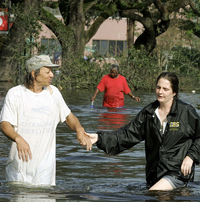Expanding the Emergency Response Fund to CDC's State and Local Partners
When Hurricane Katrina struck the Gulf Coast on August 29, 2005, public health services in the region were devastated. CDC Director at the time Dr. Julie Gerberding asked the CDC Foundation to activate its Emergency Response Fund to support CDC teams deployed to flooded communities and evacuee shelters on the Gulf Coast. Activating the Fund allowed CDC responders to use special emergency credit cards to purchase whatever they needed to get the job done, from wireless Internet cards to giant banners that promoted hand washing in shelters.
Dr. Gerberding also asked the Foundation to expand the scope of the Emergency Response Fund to provide resources directly to state and local public health agencies in the region. Many of these agencies were completely demolished - buildings and equipment destroyed, communications systems disrupted, and employees facing personal challenges that made it difficult for them to report to work. Despite these challenges, public health teams throughout the region were still desperately trying to meet the health needs of the communities they served.
The CDC Foundation issued a call for support. Kaiser Permanente made a lead gift of $2 million to the Emergency Response Fund, and the Robert Wood Johnson Foundation contributed $1 million. Hundreds of other individuals and organizations gave generously. These gifts to the Fund enabled the CDC Foundation to immediately respond to requests for help.
Meeting Urgent Requests with Speed and Flexibility
Initial requests were focused on meeting the immediate needs of hurricane evacuees and health responders. Working with CDC’s Marcus Emergency Operations Center, the CDC Foundation provided grants to health departments to:
- purchase prescription medications for hurricane evacuees with chronic health conditions like high blood pressure, asthma and diabetes
- rebuild communications systems by buying satellite phones, cell phones and laptop computers for responders on the frontlines
- support the needs of local and volunteer health responders, covering some of the costs of travel, meals and lodging
- provide emergency dental, hearing and vision screenings for evacuees, and replacing eye glasses and hearing aids when needed
- evaluate the mental health needs of evacuees and health workers, and provide counseling and assistance when needed
Rebuilding Public Health Infrastructure
After many of these initial public health needs were met, the next round of requests focused on anticipating the health needs of recovery workers and evacuees living in temporary communities or returning home to devastated homes and communities.
Before the storm, communities depended on state and local public health agencies for an extensive array of services, including direct health care, immunizations, reproductive health services, hearing and vision screenings, restaurant and water well inspection, surveillance and control of diseases like tuberculosis and West Nile virus, seasonal flu shot campaigns and chronic disease prevention and management. Local health professionals wanted to be able to continue to provide these services as well as address any emerging health problems related to the hurricanes and the recovery process.
In the weeks and months following the storm, the CDC Foundation provided grants to health departments in states directly affected by the storm and in states with a large population of evacuees.
- In Mississippi, the CDC Foundation helped the state health department acquire two specially designed modular public health clinics to replace destroyed facilities and restore public health services in Hancock and Jackson Counties. GE manufactures these modular clinics and generously agreed to donate the facility for Hancock County. Both facilities are fully functional and open to the community.
- In Louisiana, the CDC Foundation provided support for Stay Health Louisiana, a program that ensures that residents of 22 transitional housing sites throughout the state have access to preventive and primary health care. Two components of the program, a Web site and telephone hotline, were recently expanded to serve as a centralized public health information system for the entire state, delivering information on disaster/emergency recovery and preparedness, mental health and other pressing public health issues via www.stayhealthyla.org and two toll-free hotlines.
- The City of New Orleans Health Department received CDC Foundation resources to temporarily support a staff position responsible for developing health and safety messages for New Orleans residents and recovery workers and for identifying innovative ways to ensure these messages reached at-risk communities.
- In Georgia, health officials used CDC Foundation funds to establish a telephone hotline to connect individuals and families coming to Georgia from the Gulf Coast with more than 300 Georgia physicians who volunteered to provide care and with other organizations providing assistance with mental health services, transportation, food, clothing, shelter and employment.
- In Alabama, the CDC Foundation provided funds to health officials to purchase additional equipment and technology for the state’s three crisis call centers. Funds also supported a public service campaign to promote the use of the crisis hotlines and to recruit volunteers to assist with Katrina-related calls and future emergencies.
Learn More
Fund Helps Two Mississippi Counties Restore Public Health Services
